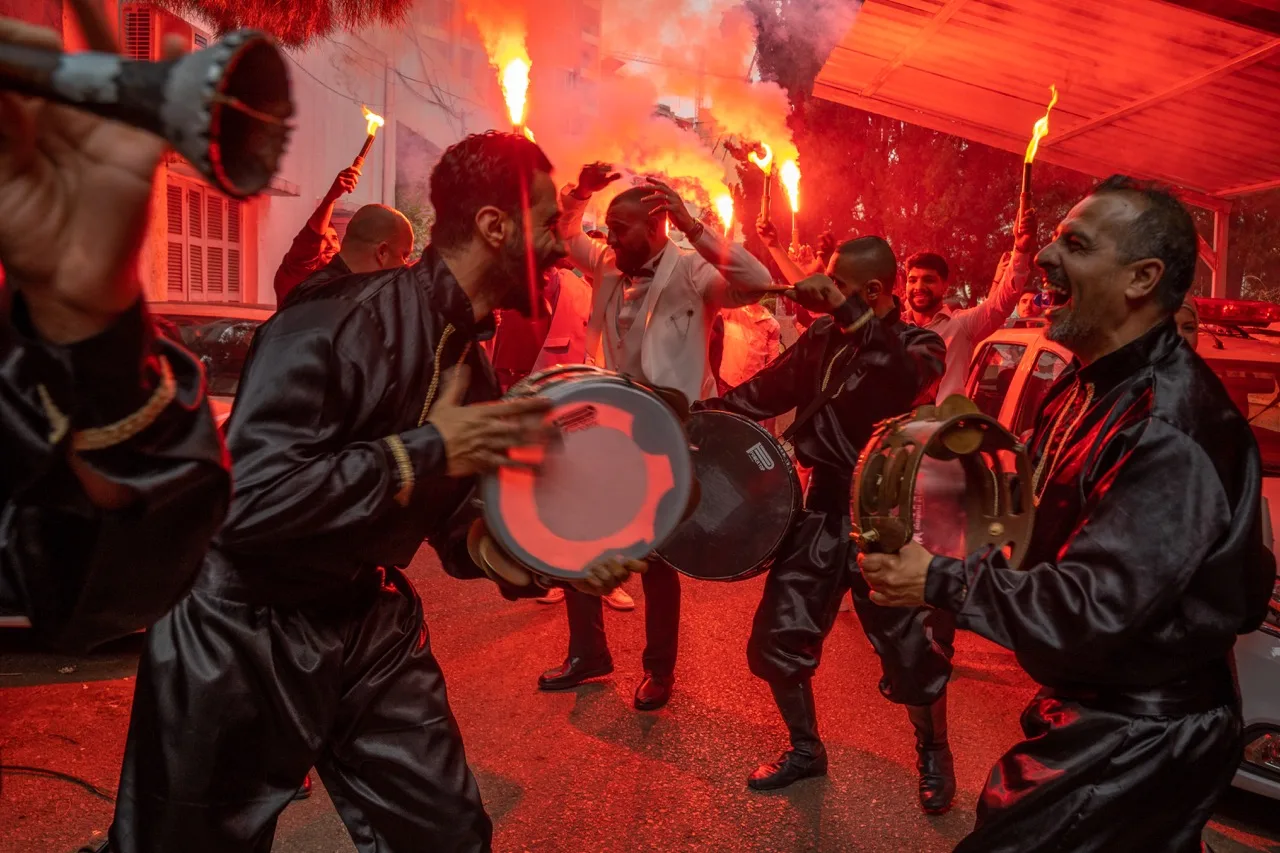 Posted in
Feature, Dazed MENA issue 02
Posted in
Feature, Dazed MENA issue 02
Ehhhhhh Weeha: Lebanon’s weddings of the heart
Text Tania Khalil | Photography Lara Chahine
Welcome to the wet and dry rituals of weddings in Lebanon, where even the dry is drenched in passion. But beneath sweat-slicked men pounding the ground in dabke and sequined women tossing laughter like rice lies a ritual steeped in contradiction.
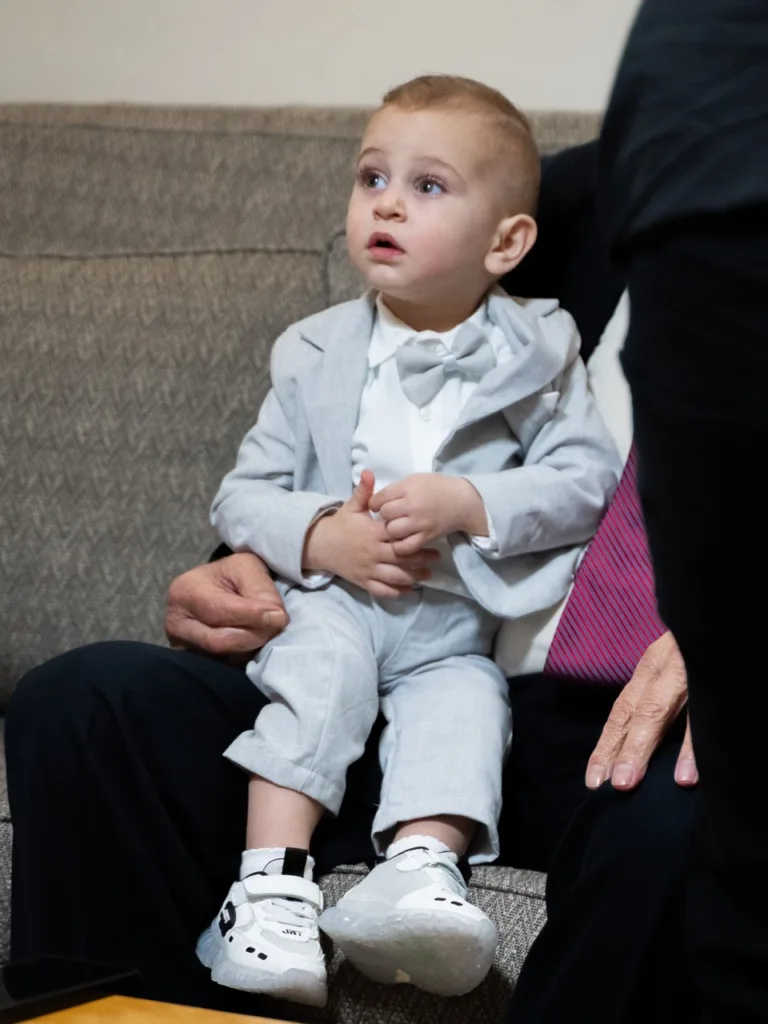
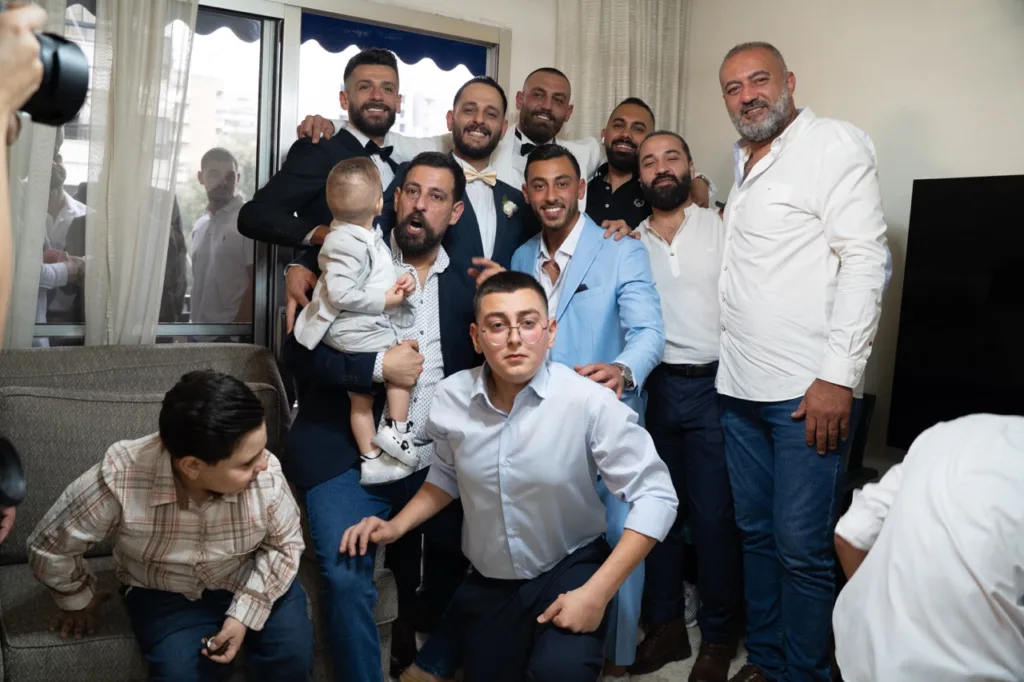
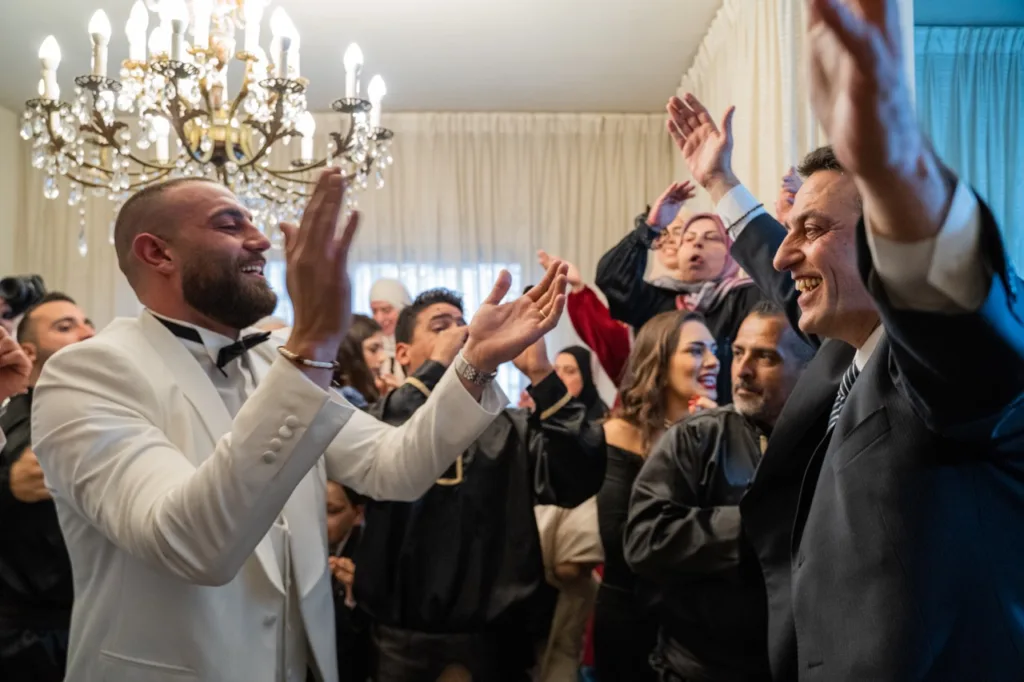








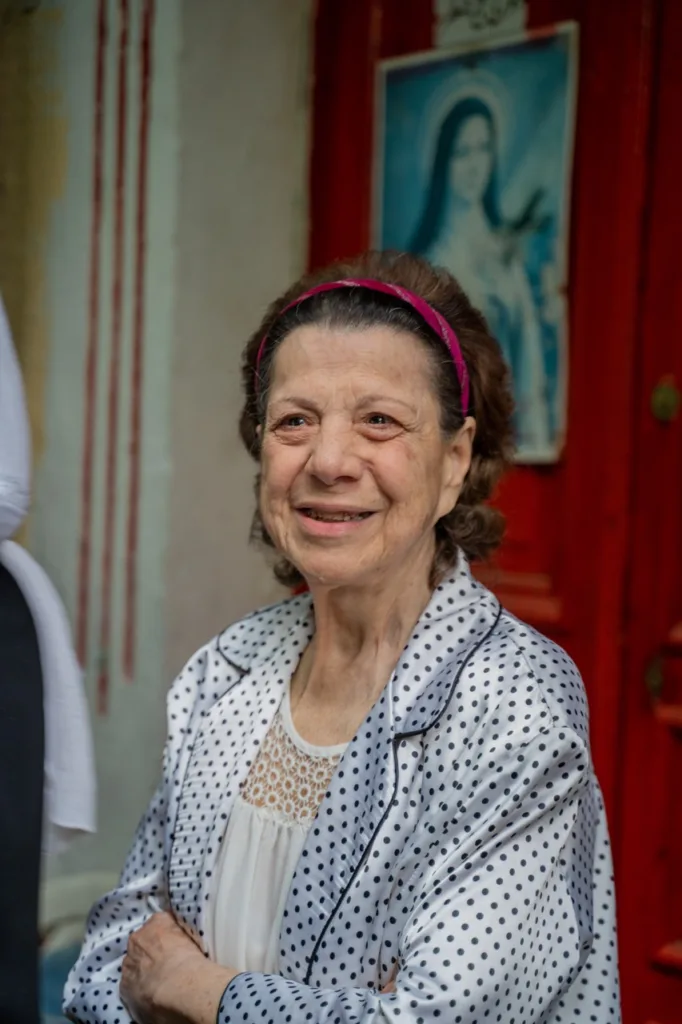


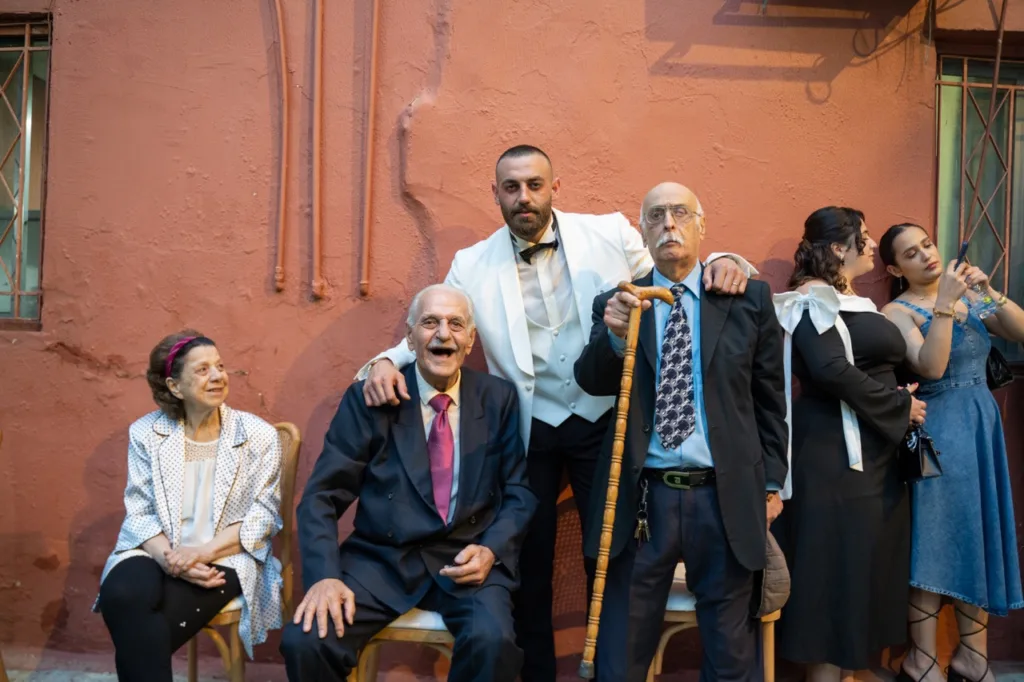



As one of the most significant rituals in Lebanese life, they often toe the line between gatekeeping tradition and serving as critical life-affirming celebrations against the lingering ghosts of colonial erasure and domestic reforms that unsettle sectarian control. Like Indian and Nigerian weddings, where colonial legacies meet cultural resilience, and extravagance masks endurance, we join the survival stage in sequins, agbadas, and rich auntie headwraps. Yes, Lebanon is up there. And if you haven’t yet scored an invite, find yourself a Lebanese friend.
This is especially true in the south, Lebanon’s underreported front line, where drones hum overhead like a second sky. But what do weddings mean to its women, who are idealised as mothers of martyrs, wives of heroes, and guardians of dignity? And how do they navigate a ceremony that can crown and confine them in the same breath?
Lebanon is a country of contrasts: mosques and churches sharing a coastline with smoker spots; sporadic wars alongside an epic, escapist nightlife; rituals of love and laws that reject them.
Between Muslim groups, Christian groups, and a shrinking Jewish community, the country has 18 recognised sects, but still no unified civil personal law. Marriage here isn’t just a personal milestone—it’s an institution shaped by the country’s patchwork of religions and sects. While diversity sounds like a strength, the country’s version stops short of inclusion. In actuality, diversity only works when inclusion is intentional. Without structural equity, difference becomes division.
Marriage – along with divorce, inheritance, and custody – is governed by sectarian courts, part of a political system that reinforces belonging to the sect first, nation second. This structure didn’t fall from the sky, either. It was cemented during the French mandate period, when colonial administrators carved out sect-based laws to ‘protect’ minorities. In practice, a mandate was colonialism rebranded as mentorship. The idea was that France would guide us towards independence and prepare us for self-governance after Ottoman rule – merci, say fromage! – with French interests at the centre bien sûr.

The French saw Lebanon’s sectarian diversity as a tool. By officially granting each sect its own legal authority, they kept communities siloed and competing. Inter-sectarian marriages can usually be handled by one of the sect’s courts, depending on agreement—or conversion. But interfaith marriages? No religious court in Lebanon will perform them without conversion. One partner must cross the line, creating tension between families that often trickles into tensions between the lovers themselves.
There was that Facebook photo of the late Pope Francis kissing the Lebanese flag and another of him with Muslim imams, the kind of image that makes hearts flutter, Facebook mom or not—even for the social media-averse among us. But it makes one wonder: if you truly love us, why not turn the sand of civil rights into stone? Why stand against us if you’re so seemingly friendly with each other?
This performance of harmony, however, stands in stark contrast to Lebanon’s legal reality, where even basic personal freedoms – like the right to a civil marriage – remain hostage to sectarian power. The French, however, left a loophole: people unaffiliated with a sect could, in theory, have a civil marriage. In 2013, a couple scrubbed sect references from official records and hired lawyers to obtain certificates. But the dozen who followed were never validated by local authorities, leaving their marriages unrecognised, and their Lebanese children stateless.

As a result, most interfaith couples who can afford it, go abroad (often to Cyprus) for a civil marriage. Only in Lebanon do you need to travel 264 km to say “I do.” A ritual of love turned into a ritual of exodus. As Tayeb Salih wrote in Season of Migration to the North, migration is never just physical. It’s political, emotional, spiritual. “I have seen all the continents of the world, and I have seen people. I have seen the illusion, the lie, the great lie. The lie that mankind is one.”
Migration, then, is not only movement—it’s protest. It’s the quiet rebellion of those who seek dignity and unity in a system that insists on division.

Regardless of region or religion, certain festive elements feel near-national: rice raining from balconies, the climactic zaffe erupting into dabke, grand processions of drums and dancers. Big or small, city or village, there’s a beautiful overlap that unites Lebanese weddings in spirit, sound, and celebration.
During the civil war, many weddings were quiet affairs held in living rooms, under curfew, with battery-powered radios playing Fairouz in the background. In contrast, today’s weddings often feel maximalist: love as spectacle, marriage as manifesto. In the south of Lebanon, where the memory of war never really leaves, weddings often take on a sacred urgency.
Unlike in the west, the wedding isn’t just about the bride. She, too, bears responsibility. And whether that glorifies resilience is a fair question to ask. In the south, her entrance is both a personal moment and a public vow: we are still here. Her dress trails generations of struggle for liberation; her smile carries the weight of women idealised as mothers of martyrs, wives of heroes, guardians of dignity.

As Mervat Hatem, a feminist scholar of the Middle East, writes, gender roles here are “shaped by the twin forces of war and welfare”—etched by a state that abandoned them and a resistance that rebuilt, often on patriarchal terms. Women in the south are often seen as anchors of steadfastness, raising children in the ideology of resistance and bearing the brunt of war’s fallout: raising children alone and managing trauma, taking over agricultural or informal work, and rebuilding homes with limited resources.
But the public discourse fails to valorise this labour the way male resistance is honoured. Martyrdom receives more symbolic capital than the role of women as first responders. Popular media (songs, plays, and even resistance poetry) often celebrate the sacrificial lover or bride—someone who marries a fighter knowing the risks.
In places like Gaza, the coastal enclave many of us hold in our hearts, couples marry beneath drones and against the backdrop of rubble, and the wedding becomes a refusal to vanish. In many parts of the Global Majority, especially in contexts marked by conflict, the threat of erasure, or state neglect, weddings hold power far beyond the altar. They are declarations. Negotiations. Survival in stitches.

Across the Arab world, weddings have long been pitched to girls as the pinnacle of womanhood, the fairy tale ending etched in henna and hope. We rolled our eyes at the princess narrative, but circled back to it eventually, scrolling moodboards and secretly noting dress details.
That very contradiction is Arab womanhood: raised to resist, yet relentlessly romantic. We are daughters of defiance, trained in endurance and taught to dream anyway. Whether under curfew, under veil, or under drone surveillance, we show up, eyeliner sharp and steps sharper. Maybe that’s why weddings here feel so monumental. Not just for love, but for lineage, legacy, and the right to joy.
In a region where public space is often male dominated, a woman’s autonomy is negotiated at every turn, between tradition and aspiration, family and self. After the zaffe fades, in many cases, the very structures that crowned the bride also confine her—laws that tether her rights to religion, to sect, to her husband’s signature.
That is the Arab woman’s inheritance: to carry herself well even in the most uneven terrain and rewrite the ending—if not today, then maybe for her daughter. The best marriage advice I ever got was from an old Irish woman (because, yes, we love the Irish) I met at a bookshop in Belfast: “May your love be modern enough to survive the times, and old-fashioned enough to last forever.”
I think Arab women have always known how to do both.
Production house FIFTEEN O FIVE, executive producer SAMER FLEIHAN, project lead JOE DEEBA
